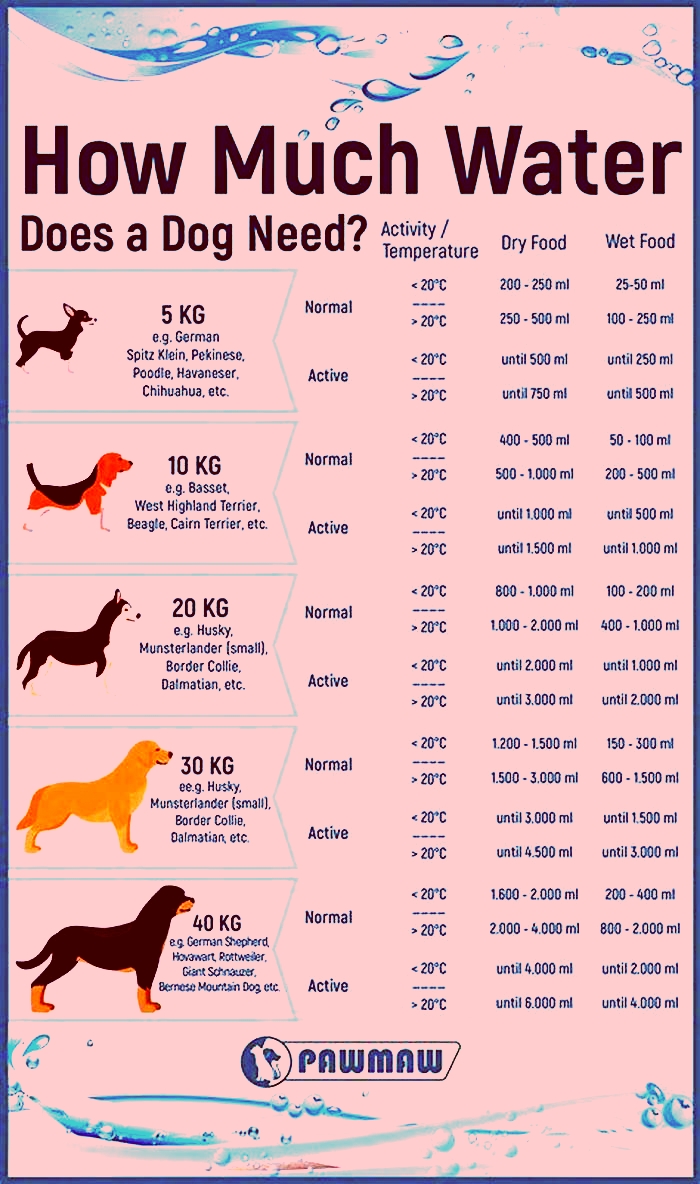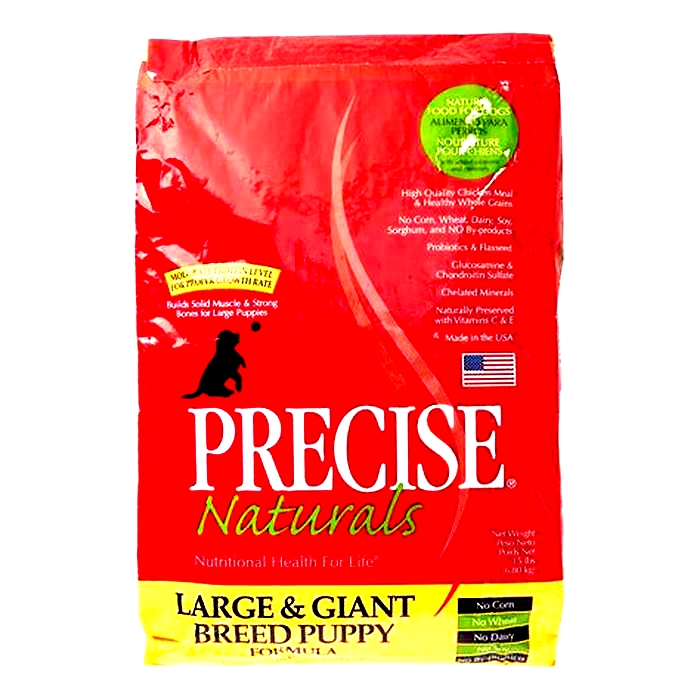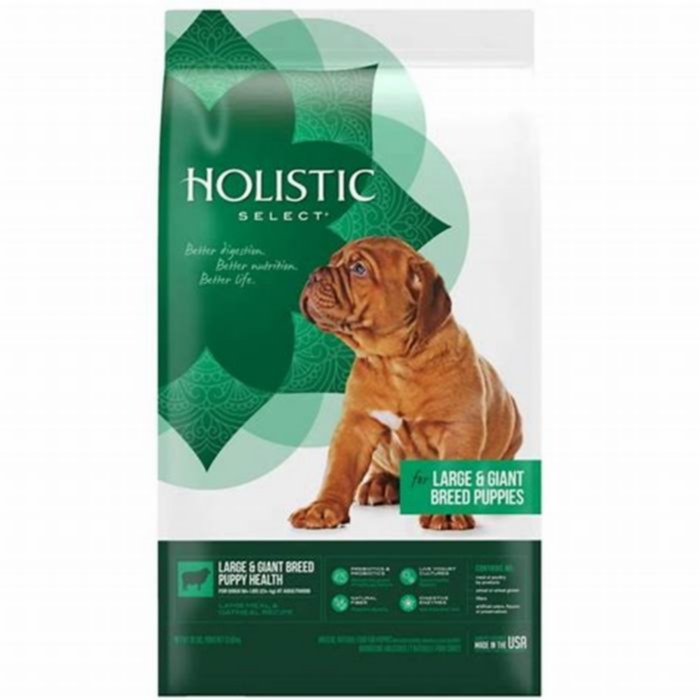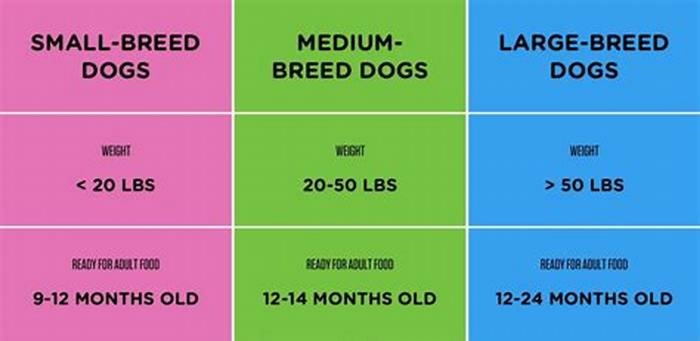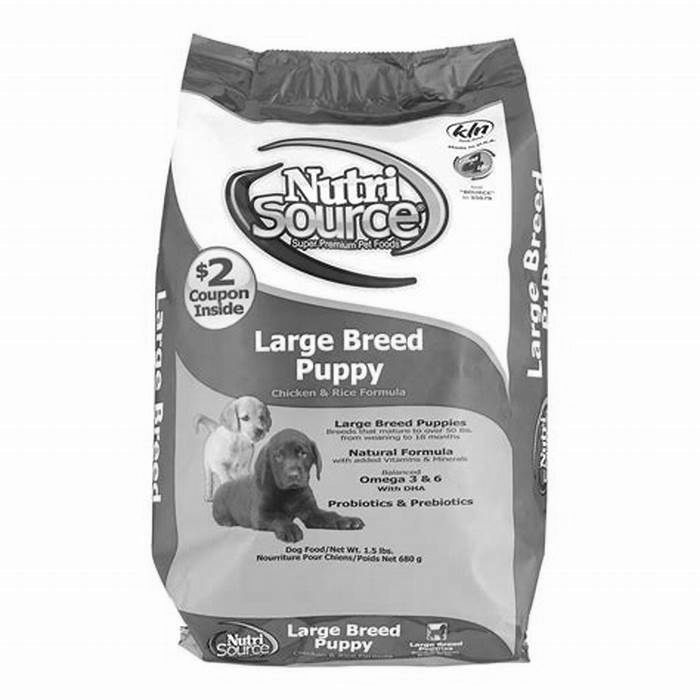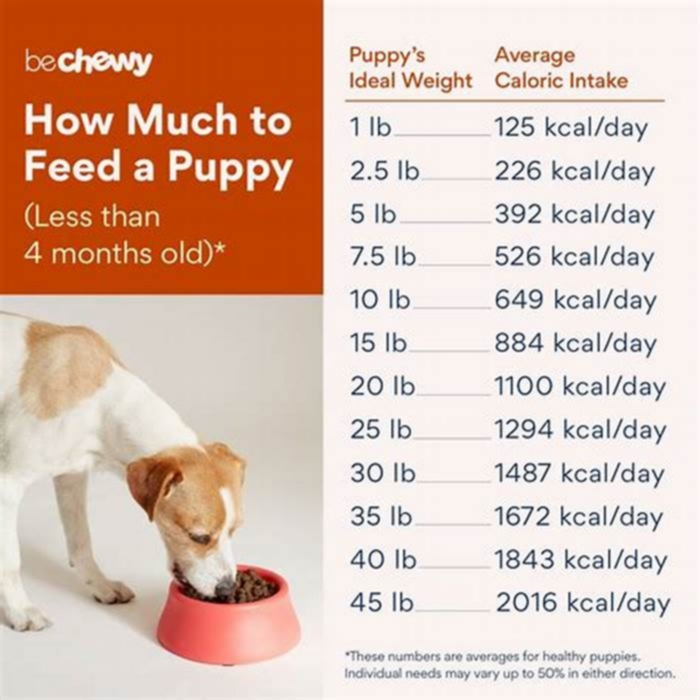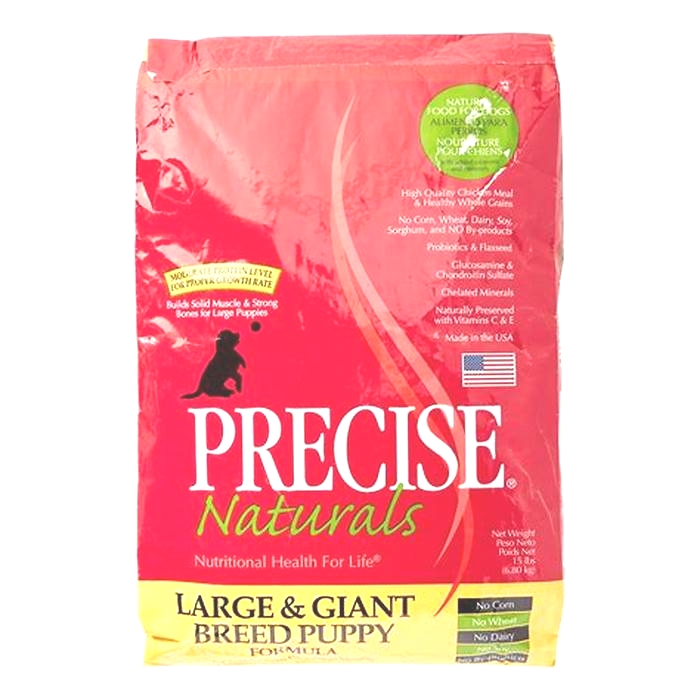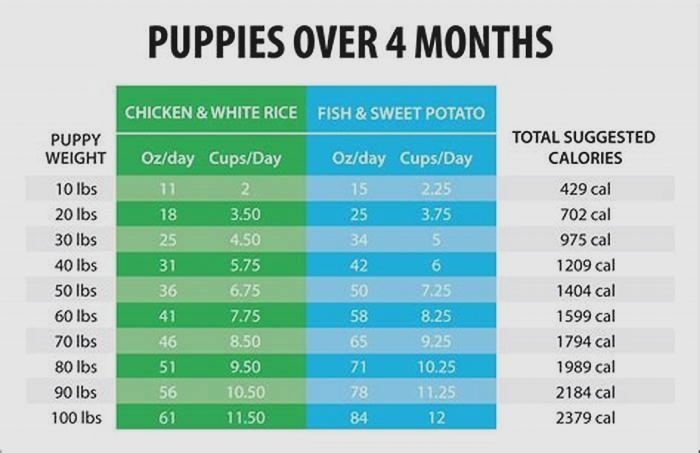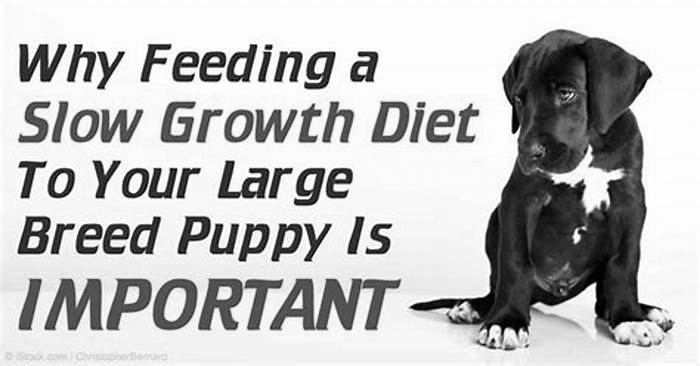How many cups of food should a large breed puppy eat a day
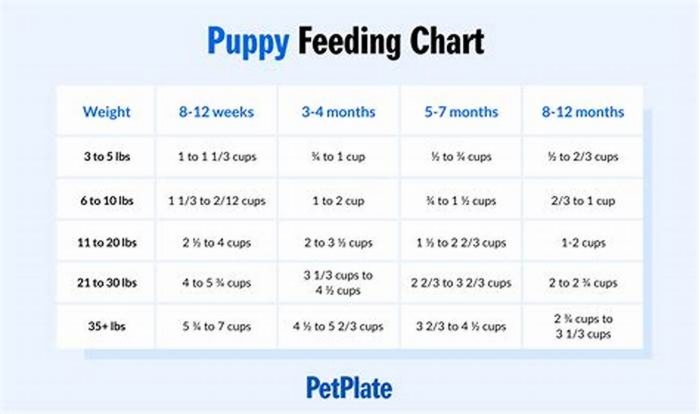
How Many Cups of Food Should a Puppy Eat?

It doesnt take long for that cute, cuddly little puppy to turn into an adult dog. No matter what kind of puppy you have, you should expect him to grow fairly quickly.
Small-breed puppies generally reach their adult size within 8 to 10 months while large and giant breeds may need 12 to 18 months or more to reach maturity.
Because different breeds grow at different rates and have different maximum sizes, the recommended amount of food to feed your puppy will vary. Keep reading to learn more about how much is the right feeding quantity of your puppy and to discover ways to tell if you are feeding him too much, too little, or just the right amount.

Puppy Feeding Quantity
Different puppy food recipes have different calorie contents, so you cannot accurately determine how much to feed a puppy in a number of cups alone. For example, Blue Buffalo Basics Turkey & Potato Recipe puppy food has 416 calories per cup while the Wellness Complete Health Grain-Free deboned chicken puppy recipe has 490 calories per cup.
A difference of 74 calories may not seem like a lot a person who eats 2,000 calories or more per day, but a 3- to 5-pound puppy may only need 400 to 600 calories a day. If you go overboard on calories with a large-breed puppy, it could cause him to grow too quickly which could put a strain on his bones and joints.
If you overfeed a small-breed puppy, he could gain an unhealthy amount of body fat which could put him at risk for obesity as an adult.
Although there is no easy answer to how many cups of food your puppy should eat, there are a few ways you can tell if you are feeding your puppy too much, too little, or just enough. During the first week of your puppys life, he should double in weight.

After that, however, he should gain about 1 to 2 grams per pound of anticipating adult weight per day. For example, if you have a Labrador Retriever who you expect to reach about 75 pounds at maturity, you should expect him to gain about 3 to 5 ounces per day as a puppy.
Weighing your puppy once or twice a week and keeping track of the results is a good way to see if you are feeding your puppy enough.
Another way to see if the amount you are feeding your puppy is adequate is to keep an eye on his body condition. It is natural for puppies to have a bit of a potbelly when he is young, but it should start going away around 3 months (12 weeks) of age.
If your puppy is getting enough to eat (but not too much or they get hiccups), you should be able to feel his ribs but not see them, and he should have a visible waist when you look down on him from above. If your puppy has so much fat that you cannot feel his ribs or if his belly protrudes from the sides, you may need to cut back on the amount you are feeding him.
If you can see his ribs, you may need to feed him a little more.
How Often to Feed a Puppy?
Before they are weaned, puppies spend most of their day eating and sleeping. As your puppy gets old enough to start eating solid food, however, youll need to start monitoring his consumption. Puppies need a lot of calories to supply their bodies with fuel for healthy growth and development, but you dont want to overfeed your puppy to the point that he gains an unhealthy amount of body fat.

Here are some guidelines to follow regarding how often to feed your puppy determined by his age:
- 6 to 12 weeks By six weeks, your puppy should be at least partially weaned and he should be fed about four times a day to ensure that his needs for energy and nutrients are met. For six to eight weeks, you should be feeding your puppy moistened dry food. Small-breed puppies should be transitioned to plain dry food by 12 weeks and large-breed puppies by 9 or 10 weeks.
- 3 to 6 months Around 3 months (12 weeks) of age, your puppy should start to lose her puppy fat and youll want to decrease her rations to three feedings a day instead of four. Keep an eye on her weight and body condition to ensure that she is developing properly.
- 6 to 12 months For small-breed puppies, you can expect growth to slow down a little bit around 6 months, though they may not be ready to transition to adult food for another month or two. Large-breed puppies will still need a puppy formula until they are at least 12 months old. Around 6 months is when you should consider spaying or neutering your puppy as well which could change his metabolism, so keep feeding her three times daily but keep an eye on his weight and condition.
- 12 months and up At this point, most puppies will be ready to switch from a puppy formula to an adult formula. Depending on your dogs size and activity level, you may want to switch to two daily feedings. Large-breed dogs should be fed twice daily while small-breed dogs may still do best with three daily feedings, as long as the portion sizes and calories are controlled.
Every puppy is different, so there is no definitive answer to the question of how many cups to feed a puppy per day. Small-breed puppies may not eat as many cups of food as large-breed puppies, but they generally need more calories per pound of bodyweight than larger dogs.
To make sure that your puppy gets what he needs it is best to feed him a size-specific puppy formula until he reaches 80% of his adult size and then switch to a size-specific adult recipe.
German Shepherd Feeding Chart: How Much Should I Feed My GSD?
German Shepherds are a loyal, lovable dog breed that humans have raised for generations. These lovable kiddos consistently come in at the top of the list of favorite dog breeds. Currently, they hold the number two top spot in the United States, second only to the Labrador Retriever.
German Shepherds are big dogs and need a lot of room, as well as a lot of food. Knowing what to feed a big, energetic pup like this can be very intimidating. Learning what to feed them, how much to feed them, and any special needs can be a considerable challenge. Every dog is different. However, new owners of a big breed like this can expect to spend a significant amount of time and money on their pups dietary needs.
From bringing home a new pup to knowing what to feed an active or aging dog, German Shepherd nutrition is a huge part of caring for one of these big, lovable pooches. The good news is that owners can become experts in feeding their pups if they take things one step at a time. We are here to help and have everything canine owners need to know in our comprehensive German Shepherd feeding chart and guide.
German Shepherd Feeding Chart
How Much Should A German Shepherd Puppy Eat?

While feeding guides and breed overviews can provide general information and guidance, they are not an exact prediction of what every dog will be like.
German Shepherd puppies need a diet that is specially formulated for large breeds. Food should be higher in calories and fat than adult dog formulas. These hefty pups reach anywhere from about 50 to 90 or more pounds fully grown, so they need food that is high in calories, protein, and nutrients to support their rapid growth and development. Puppies will grow quickly, and their nutritional needs will change as they age.
Week 1
Newborn puppies will need only their mothers milk. They are blind and deaf at birth because neither their eyes nor ears have opened. It is essential for puppies to nurse as much as they need to. Right now, the mama dog is making colostrum. It is crucial that puppies receive this nutrient-rich supplement from their mothers. Colostrum is the first milk mothers produce directly after birth. Mother dogs create colostrum specifically to meet the unique needs of their babies. It is loaded with growth factors, antibodies, hemoglobin, and other nutrients vital to development. There are formula supplements. Colostrum cannot be recreated artificially. It is especially important that mother dogs breastfeed as soon as possible after birth so that their puppies get as much of this nutrient-rich formula as possible.
Mother dogs should always be encouraged to nurse their pups as much as possible. For varying reasons, this may not always be possible. Some dogs may be unable to produce enough milk to sustain a litter. In these cases, it is essential to speak to your veterinarian right away to come up with a plan and pick an appropriate breast milk formula substitute. For the first couple of weeks, puppies may need help being stimulated to use the restroom while they get stabilized and used to being in the world.
Week 2
At week two, puppies will not be as delicate. They will have started to fill out a little bit, and their eyes and ears will open or begin to open. They will still not do very much other than nurse and sleep. Pups will need to nurse several times a day and will want to stick close to mom for these first few weeks after birth. If they are not getting enough sustenance from mom, it is important to start supplementing with an appropriate formula substitute. Do not use cows milk or goats milk. Make sure to speak with your veterinarian before choosing any supplements. Remember, even though they are big dogs, these are still babies with very delicate digestive systems.
Week 3
At three weeks, German Shepherd puppies will have discovered their legs and will start to experiment with walking around. They will not be very steady on their feet yet but will start to get an understanding of how walking around works. They will be able to fully see and hear by now and may start to roughhouse and play a bit with other litter mates. Puppies should still be nursed by their mothers four or more times a day. They are not quite ready for solid food yet. Puppys teeth will start to come in right about now, so chewing and mouthing behavior may begin to be noticeable.
Week 4
By four weeks old German Shepherd pups will be fairly steady on their feet and quite curious. They will start to become very playful with litter mates, mother dogs, and human caregivers. Their teeth will be very obviously growing in by now, and chewing behavior may be strong. Puppies will still nurse for the next few weeks but can start to be offered a small amount of puppy mush at this time. Puppy mush should consist of high-quality puppy kibble or wet food mixed with water. For now, this much should be mainly water, about one-fourth parts food to three-fourths parts water.
Week 5
Five-week-old German Shepherd puppies will be reasonably solid with walking though they may still experience some balance issues. They will still be nursing from Mom but should be offered the puppy mush mixture of food and water several times a day. Puppies need to wean at about 6 to 8 weeks, so they must start eating solid foods now. For the next two weeks, expect them to burse less and eat more of the puppy mush.
Week 6
It is time to start weaning! Moms milk is starting to slow, and she is likely exhausted from sustaining puppies around the clock. Allow the puppy to nurse once or twice a day but offer them the puppy mush several times. As they start to eat it more, you can lessen the water. This process will take a few weeks. Puppies can be offered a piece or two of dry kibble. It will help them learn to eat it and feel great on their teeth. It is vital for pups to eat solid foods, as they cannot rely on moms milk much longer.
Week 7
Puppies will continue to explore new places on their ever-growing legs. Seven weeks old is a pivotal time when it comes to feeding a German Shepherd puppy. Puppies should be fully weaned from their mothers by eight weeks of age. It is time now to offer them puppy mush, plenty of fresh water, softened kibble, and only very occasional nursing. Be prepared for some behavior issues right around now. Weaning from their mother is a big deal for these little kiddos.
Week 8
German Shepherd puppies should be completely weaned from their mothers and independent by eight weeks. They are ready to explore, will be very steady on their feet, and full of energy. They will need to be fed high-quality, well-balanced puppy chow, preferably one formulated for large breeds. It is essential that puppies eat when food is offered to them. While some owners prefer free feeding, this is not smart because owners cannot monitor how much their fur babies are eating.
Additionally, if more than one puppy is eating from the same area, it is likely that at least one puppy is not getting enough. Puppy mush can continue to be offered. Offering a variety of puppy kibble, along with wet food, will keep your puppy interested in food and provide him everything he needs to grow big, strong, and healthy. 8-week-old German Shepherd puppies should eat about one to one and a half cups divided into four or five meals.
It is particularly important that puppies learn when mealtimes are. Offer them meals at specific times of day, allow them 20 minutes to half an hour to eat, and then remove the food. Do not offer them kibble again between feedings. If they get hungry, they will learn that they need to eat at mealtimes. Puppies will be very rambunctious right now and will need a lot of training. They should also start potty training if they have not already.
Week 9
At nine weeks old German Shepherd puppies will be entirely eating puppy chow or the puppy mush mixture. Continue to soften their kibble with water for as long as it seems necessary, gradually decreasing the amount of water added. They should continue to eat 4 to 5 meals a day. Four meals a day is ideal until about twelve weeks.
Week 10
By ten weeks, a German Shepherd puppy will no longer look for moms milk. Puppy food and plenty of water will make up their diets. If a ten-week-old puppy refuses to eat puppy chow, it is time to call the veterinarian for some ideas. They should still be eating softened puppy kibble with some wet food mixed in. Some owners may want to feed wet food first and then introduce dry kibble slowly. Make sure to stick with puppy formulas for the next several months. Large breed formulas are best. Campers will eat between one and a half and two cups of food.
Week 11
By now, German Shepherd puppies will be highly active and use a lot of energy. They must eat enough calories to support their quickly growing bodies. Avoid free feeding. Instead, encourage your pup to eat during mealtimes. Offer both softened kibble and wet food. Two cups of food will be a good guideline, divided into three or four meals.
Week 12
At twelve weeks or about three months old German Shepherd puppies should be happily eating both kibble and wet food. They should not have a problem being offered only kibble. Owners may want to continue to mix wet food in for variety and extra moisture.
Continue to feed large-breed puppy food, as formulas developed for all ages and adults will not sustain the rapid growth that puppies are about to embark on. Try to stick to two to two and a half cups a day. Puppies will enter a period of rapid growth at this time and may need a little more. Between two and three cups a day is a good guideline. Puppies should eat three meals a day from now until they reach full growth at around 18 months of age.
6 months
At six months of age, German Shepherd puppies will be well established in their eating habits and should have no problem eating kibble or canned food. Around this time, owners can start to introduce new ingredients like raw meats, crushed bones, and eggs. These should not be given every day but are a nice treat and supplement to boost their body growth and immune systems.
10 months
Around ten months old pups can start to be introduced to adult dog chow. This does not mean they should be rapidly switched. Owners can start by offering them a taste of adult kibble and mixing a tiny amount in with their puppy chow. Starting with a very small amount, 5 to 10% of their food can be the new kind, with about 90% being puppy chow. Gradually increase this amount each week until they have fully transitioned to adult formula.
1 year
Around their first birthday celebration, German Shepherd pups will start eating a little less and may seem to have less appetite. Their bodies are no longer growing so quickly, and the puppy metabolism is starting To mellow out and slow down. Around the one-year mark, owners can begin to offer two or three meals a day. Adult dogs generally do very well with 3 to 3 1/2 cups of food divided into two meals a day. Keep in mind that larger dogs may need more than 3 1/2 cups. Always make sure your dog is getting enough chow but is not overeating.
18 months
Between one year and 18 months, German Shepherds can start to eat once or twice a day. If owners notice that food is being left in the bowl, they can reduce the amount they are feeding them. Most dogs would like to eat twice a day. Some may prefer one large meal at midday and treats to supplement. By now, owners will be well versed in their dogs specific eating habits and nutritional needs and can offer any supplements, extra vitamins, or additives that will help support them. This is a breed that is prone to sensitive stomachs and digestive issues. Because of this, owners may choose to continue to feed them several small meals throughout the day rather than one or two large ones.
Different Types Of Puppy Food
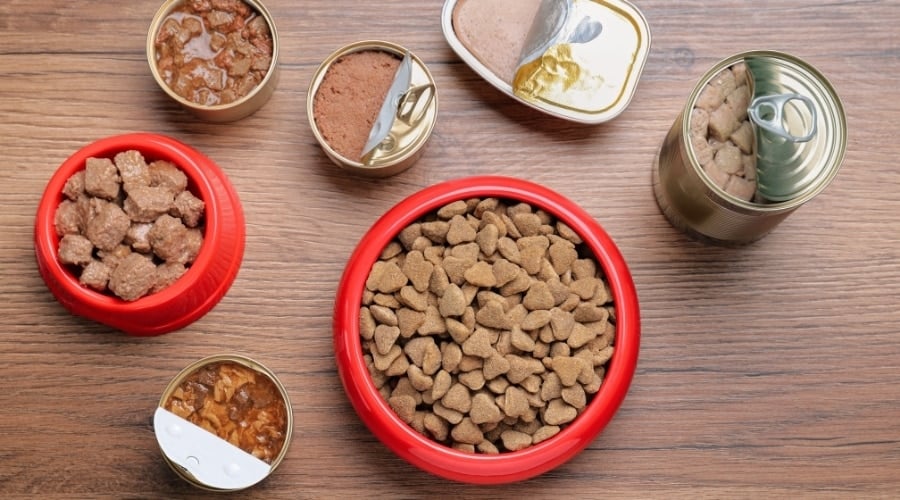
Always pick puppy-formulated products, not one for all ages. When German Shepherds reach adulthood, they will need to eat a large breed-specific adult formulated food.
Dry Food
Kibble or dry food is a popular choice. It is the least expensive option for owners, is sold in large amounts, and stays good for an extended time if stored properly. Kibble has a wide range of choices, and the most reputable commercial brands will offer complete nutrition for your pup. It is convenient, does not spoil, and has several flavors. Kibble has some dental benefits to dogs as it helps scrape plaque and build up off their teeth. Avoid semi-moist varieties, especially those that are shaped like human foods. These are usually of poor nutritional value and will not sustain healthy growth and development. Occasionally, these might be a nice-tasting treat, but do not rely on these for complete nutrition. Always read ingredients in kibble to ensure they list meat as one of the first ingredients.
Wet Food
Wet food is also called canned. It can come in pouches as well. These options are delicious, and many dogs prefer them. Wet foods are pricier than dry kibble. Many owners choose to feed their dogs a mix of dry and wet. Some varieties may not offer everything your pup needs nutritionally, so always read ingredients and labels. Brands that use natural, whole ingredients and few fillers are best. Wet foods will cause loose stools. Additionally, they can sometimes be low in digestible proteins and high in fats. This is especially true for varieties that have lots of gravy.
Fresh Food
Fresh food is made from human-grade ingredients and is usually designed by veterinarians. These fresh meals are prepared for dogs every day using top-quality ingredients and recipes. These are often sold by subscription and will be specifically formulated for your dogs breed, age, weight, and individual needs. Fresh foods are likely the most expensive. They are exceptionally good for dogs. If you want to add some fresh ingredients to your dogs diet, you can talk with your vet about how to start.
Home Cooked
Some owners choose to make home-cooked meals for their dogs. This can be hit or miss, and owners should always work closely with their veterinarians to ensure they meet all of a German Shepherds nutritional needs. This is not the same as simply feeding dogs meals that are made for humans. Meals prepared for dogs should be made explicitly for them and free of added seasonings and ingredients like onion that can be harmful to dogs. This can be an extremely healthy option if done right. It is quite a time commitment and very expensive, so not everyone will want to try this.
Raw or BARF
Raw diets are also referred to as biologically appropriate raw food or BARF and include bones and raw food. This diet choice is better for adult dogs. Raw diets can be too rich and complex for a puppys still developing digestive system. Raw diets must include edible bones, organs, muscle meats, vegetables, fruit, seeds, nuts, and grains. Never switch to a raw or BARF diet for your German Shepherd without discussing it with your veterinarian first.
Puppy Food vs. Adult Dog Food
Puppy food and adult food are specially formulated to meet the diverse needs of dogs at various stages throughout their lives. Puppies need more than what adult food offers as they are constantly growing. They need high protein and high in healthy fat diets. Adult dogs need fewer fats and fewer calories. Adult-formulated dog food tends to have more filler ingredients.
It is important to feed dogs the correct puppy or adult-formulated food. Adult dogs who eat puppy-formulated foods will have too many calories and will be at risk for obesity, diabetes, and heart concerns. Puppies who eat adult dog chow will not have enough calories, protein, or fats. Large breeds should eat puppy-formulated options longer, as they may not fully develop as fast. The Association of American Feed Control Officials (AAFCO) provides regulations and guidelines for dog food. Their standards are as follows:
- Arginine 0.62% for puppies and 0.51% for adults
- Protein 22% for puppies and 18% for adult dogs
- Fat 8% for puppies and 5% for adults
- Calcium 1% for puppies and 0.6% for adult dogs
- Phosphorus 0.8% for puppies and 0.5% for adult dogs
- Sodium 0.3% for puppies and 0.06% for adult dogs
- Lysine 0.77% for puppies and 0.63% for adults
- Leucine 0.72 % for puppies and 0.59 for adults
- Chloride 0.45 % puppy 0.095 for adults
- (*This is not a complete list)
The Importance Of High-Quality Food
It is especially important to feed a German Shepherd of any age food that is made with high-quality, natural ingredients. Less expensive brands of dog chow may not be worth the savings in the long run. Lower quality brands tend to use lots of additives, preservatives, filler ingredients, artificial colors, and other ingredients that do not add any nutritional value.
These foods may be low in nutrient value and will not offer enough protein. While these may save owners a few dollars, cheaper brands are not worth the risk of poor nutritional health for a dog. The best diet choices for a German Shepherd depend on size, age, health, and specific break. Remember, adult dogs will need fewer calories than puppies. Active adults will still need high protein, nutrient-rich diets.
Why Is Large Breed Puppy Food Important?
Large breeds need different nutrients than smaller breeds to keep them healthy. Because they are a larger breed, keeping them at the right weight is very important. This breed often develops hip dysplasia and orthopedic conditions. Poor nutrition and extra weight can make joint problems like this much worse.
Large-breed puppy food is specifically formulated to support heftier breeds of dogs like the Pit Bull, Great Dane, and German Shepherd. These formulas will have some differences from regular puppy food. Feeding a large breed puppy this specially formulated diet is essential because it helps control their growth and keeps them healthy. This breed can reach close to 90 pounds fully grown. Imagine putting on that much weight in just over a year. That puts a heavy toll on the body, and German Shepherds need the right diets to support that level of rapid growth and keep them at a healthy size and weight.
Foods formulated for large breed puppies will have less fat, lower calcium, lower vitamin D, and lower phosphorus than regular puppy chows. Elevated calcium and phosphorus levels are a factor in developmental orthopedic disease, and these options are specially formulated to help reduce this risk in large-breed puppies. This is also why feeding puppies smaller meals throughout the day is recommended rather than free feeding or just two larger meals.
What Nutrients Do German Shepherd Puppies Need?

Puppies should eat about 500 calories daily, increasing to about 1,600 calories around 15 or 16 months old. Adults will need between 1,700 calories and 2,400 calories every day. Senior dogs require less, between 1,300 and 1,600 a day. Owners need to read labels and consider all the different needs their pup has when choosing what to feed them.
Protein
German Shepherd puppies require a high level of protein. Any diet they eat should have at least 22% protein. Adult dogs need less, about 18%. Protein is one of the main elements of a growing puppys diet. It provides the energy to support their rapid growth, as well as helps build up strong muscles. Protein is also heavily involved in the immune system, musculoskeletal system, and the growth of skin, hair, and nails. Look for dog foods that use whole meat proteins found in beef, poultry, lamb, turkey, eggs, and fish.
Fats
Both adult and young German Shepherds will need fat in their diets. That is quite important and is derived from the protein they eat. Fat helps provide energy to the body and plays a key role in the development of the body systems, as well as in coat and skin health. Puppies should have about 8% fat in their diets, while adults should only have about 5% fat.
Carbohydrates
Healthy carbohydrates work along with protein and fat to help sustain and support German Shepherd puppies throughout their busy days. Good sources of carbohydrates are oatmeal, rice, barley, corn, wheat, millet, and other grains. Additionally, carbohydrates can be found in vegetables like sweet potatoes, lentils, and peas, all common ingredients in many commercial varieties.
Fiber
Fiber is particularly important to regulate the digestive system. This can be a considerable concern, especially for puppies. Fiber is very low in calories and can be found in different fruits and vegetables, such as green beans, apples, sweet potatoes, beets, carrots, strawberries, and lettuce. German Shepherds are highly susceptible to developing bloat and gastric torsion. High fiber diets can be preventative and help to control this problem. Try to limit corn and soy as these can make the bloat worse.
Omega Fatty Acids
Omega fatty acids are especially important in puppy development. Though owners should be careful about excess fat intake, healthy fats from Omega fatty acids found in fish, meats, fish oils, and other oils can be greatly beneficial. These fatty acids help with skin health, health, as well as brain and eye development.
Vitamins And Minerals
German Shepherd puppies will need a blend of vitamins and minerals as well as other nutrients to support growth and keep them healthy throughout their lives. Most high-quality commercial dog foods have an appropriate balance of vitamins and minerals. This breed needs vitamins C and B to help support strong bones, connective tissues, and teeth. They can naturally produce vitamin C but need to get all their vitamin B from their diet. Additionally, vitamins A, D, E, and K are found in animal fat and are essential for body functioning, eyesight, building bones, and many other major body functions.
German Shepherds of all ages tend to do better on grain-free kibble because they can be allergic or intolerant to many of the grains used in commercial dog foods. Corn, in particular, is often used as filler and can trigger dietary issues and digestive intolerance in this breed. Discuss a grain-free diet with your veterinarian if you think this might be something beneficial to your dog. There are pros and cons to both, and owners should feel comfortable discussing this at length with their veterinarian to make the best choice for their pup.
How Much Do German Shepherds Grow Each Week?

German Shepherd puppy growth will fluctuate from week to week. They have a much higher period of growth, from about three to six months. This breed will grow quite large quickly, adding almost ten pounds a month for the first few months. They can add two or more pounds every week. Growth will slow down around six months old and taper off around 12 months though this breed can continue to fill out until they are two or three years old. This breed is considered fully grown at 18 months old, but they do not stop growing at this time.
Keeping Your German Shepherd At The Right Weight
Owners must remember that not all dogs are the same, even within the same breed and family. Thes big tykes love to eat and may want to overeat, which can be very risky for them due to their larger size. Owners must be meticulous in making sure these dogs are not overeating and that the food they eat is healthy and full of the proper nutrients to keep them healthy.
Overweight German Shepherds will have several long-term health issues, including osteoarthritis, joint dysfunction, heart malfunction, bloat, diabetes, obesity, arthritis, and more. It is best to keep them at a healthy weight starting at puppyhood to ensure long life and lower the risk of disease.
Owners should closely monitor what their German Shepherd puppy eats and how much of it they consume. Make sure not to offer extra meals or supplements throughout the day and to train puppies to eat at mealtimes. Puppies need several smaller meals spread throughout the day to sustain their energy and growth. Adults will need fewer calories than puppies. This is especially important to remember because even though adult dogs will happily scarf down puppy chow, it is not healthy for them. Puppy chow is too high in fat and protein as well as has excess calories.
German Shepherd puppies on the overweight side should be closely monitored and possibly put on a weight maintenance diet. They will need their calories cut and may need to be smaller portions at mealtimes. Increasing activity and physical exercise can help manage extra weight gain and help a German Shepherd lose weight. Always make sure to keep your pup properly hydrated, and only offer them water to drink.
Frequently Asked Questions

When should a German Shepherd puppy stop eating puppy food?
German Shepherd puppies can stop eating puppy chow between 12 and 18 months. This transition should not be sudden and will take a few months to complete. Until they are about one year old, these puppies will need to eat puppy chow as it is specially formulated to help support their rapid growth and development.
Do German Shepherds have sensitive stomachs?
German Shepherds are a breed that is known to have a sensitive stomach. Because of this issue, owners need to be especially careful about what they feed them. Most of these digestive issues will develop later in life, but some can be present even in puppies. This breed often has diarrhea or loose stools, gas, and occasional vomiting. They are also prone to developing bloat or gastric dilation volvulus. Because of their stomach sensitivity, it is often recommended to feed several small meals a day rather than a few larger ones.
Do German Shepherds have food allergies?
Just like all canine breeds, German Shepherds can develop allergies to certain foods. Allergies are often triggered by some animal proteins, including beef and chicken. Sometimes German Shepherds may have an intolerance to things like soy, milk, eggs, and wheat. Allergies can also be environmental and include things like dust, pollen, mold, perfume, air freshener, certain fabrics, plants, or grasses.
What is the best dog food to feed German Shepherds?
It can be extremely hard to pick the right nutrition and diet for your German Shepherd. Sometimes this is a process of trial and error, and owners can also look to feeding guides like this one as well as recommendations for the best food for German Shepherds to help them make an educated decision. Veterinarians and canine nutritionists are also great resources when it comes to picking well-balanced high-quality dog chow.
Final Thoughts
These dogs serve many purposes, from work dogs, guard dogs, and service dogs to beloved pets. This breed makes a loyal, majestic, and lovable pet and deserves to be fed the absolute best. It is always best to start out by feeding German Shepherds specially formulated puppy food for large breeds and then transitioning them to a large breed adult formula when they have reached between a year and 18 months old. It is always best to feed dogs options specifically formulated for them and not meals meant for human consumption.
Hopefully, our German Shepherd feeding chart has helped you understand more about what these amazing dogs need in their diets to develop into happy, healthy dogs. The information we have offered is a general overview and is not intended to substitute for the advice of a qualified nutritionist or veterinarian. Once a puppy leaves their mother, it is up to the owners to make sure they are getting the right nutrition throughout their lives. Feeding a German Shepherd is no small task, but it is just one of the many things owners will happily do to keep their free babies happy and healthy as long as possible.

